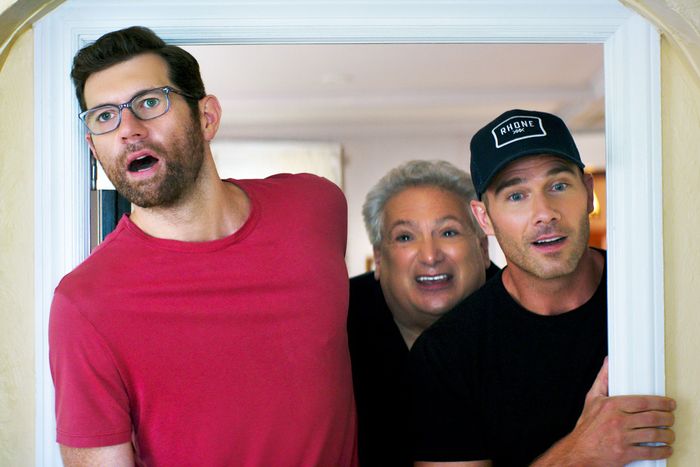
For months now, Billy Eichner has been touting the milestones represented by his new film, Bros. It’s the first gay rom-com ever made* (*by a major studio). It’s the first movie* (*at a major studio) to star and be written by an openly gay man. It’s not some indie or “some streaming thing which feels disposable,” as he said to Variety, words he then clarified after they were interpreted as a slight against fellow gay rom-com Fire Island, which premiered on Hulu in June. Also, it’s about 40-year-olds who fuck, not a coming-out story about someone fumbling their first kiss, like roughly 90 percent of gay stories onscreen are, he declared to GQ. Eichner has done so much work to load down Bros with qualified historical significance, and to insist that it’s not like those other gay movies, that it’s a pleasant surprise to finally watch the thing and find it to be sexy, messy, and joyful, and informed less by a sense of its own importance than by a vague uncertainty that it may have arrived too late to the party. It is, after all, a rueful ode to a white masc-centric gay culture that the movie understands to be passé and exclusionary even as it has been its protagonist’s whole world.
In that, as well as in an appearance from Bowen Yang, it has something in common with Fire Island — the bittersweet love story at its core is less with a person than with the idea of gay community, which its main characters value even as they feel consigned to its outskirts. Of course, in the case of Bros, the man that Bobby Leiber (Eichner) falls for is representative of so much that that community prizes that he feels, at least at first, like a symbol. Aaron Shepard, played by repeat Hallmark star Luke Macfarlane, is a muscled hunk of a lawyer who likes Garth Brooks and group sex, and who’s just as commitment-averse as the avowedly independent Bobby. When the pair survey a dance floor during their meet-cute, Aaron points out one of the dancers and, by way of small talk, says, “I’m supposed to fuck him and his husband later.” Bobby is as embittered by the ease with which Aaron moves through their world as he is by himself for being attracted to the guy, and yet the two strike up a sparky anti-courtship in which they feel their way through what a relationship between them might look like.
Bros was directed by Forgetting Sarah Marshall’s Nicholas Stoller, who co-wrote the script with Eichner, and produced by Judd Apatow, and there’s a familiar Apatovian shagginess to the production. It’s not overlong, but it’s prone to digressions that can make it feel like it’s stuffed with every stray idea and rant that Eichner scrawled in a notebook over a decade, from adventures on Grindr to a bit about his singing voice. For the most part, they’re funny enough for this not to be a complaint, and Stoller and editor Daniel Gabbe have excellent timing with cutting on or to a punchline. Still, Bobby’s the newly appointed director of the first-ever LGBTQ museum, and the movie takes pains to establish him as the host of a successful gay-history podcast first, mainly to give him an excuse for a disgusted monologue into the mic about how he was approached by a Hollywood producer to write the kind of gay romantic-comedy “a straight guy might watch with his girlfriend.” An odd, vestigial storyline about Aaron’s high-school friend is only there to reflect Bobby’s insecurities. And when Bobby walks in on Aaron injecting testosterone, he disapproves until Aaron retorts that it “doesn’t seem to bother you when you’re obsessing over my body,” and the issue drops.
Aaron — whose traditional masculinity hides some internalized homophobia — represents so much that loud, militant, concave-chested Bobby has resented and yet wants, and the film can’t quite square his resistance with his desire. It’s better for it. When Bros begins, it’s hard to imagine how a plausible romance is going to struggle out from everything the movie feels it must represent with regard to bigotry, desirability, being visibly gay, and having relationships that don’t feel beholden to heteronormative ideals. It’s only when Bobby is allowed to show his fear, and Aaron becomes more than just a handsome blank, that they actually start to seem like individuals who like one another. While Eichner plays an entertainingly outsize version of his own public persona — opinionated, wry, occasionally annoying — Aaron isn’t as successfully filled out, though Macfarlane has a dry deadpan that makes the character more stealthily funny from the start than Bobby wants to acknowledge. But, as accessorized by a variety of supporting characters played by Guillermo Diaz, Miss Lawrence, Jim Rash, Monica Raymund, an especially fun Guy Branum, and others, the pair’s fumblings toward a connection have an understated sweetness. For all Eichner’s intentions to make history with the movie, it’s at its best when it frees itself from representing anything more than two characters falling in love. That gives us more space to laud its pioneering work in putting awkward foursomes onscreen, anyway.
More Movie Reviews
- Dune: Part Two Is Zendaya’s Movie
- Drive-Away Dolls Is Just Fizzy Enough
- Pedro Almodóvar’s Queer Cowboy Short Is Too Sumptuous for Its Own Good





